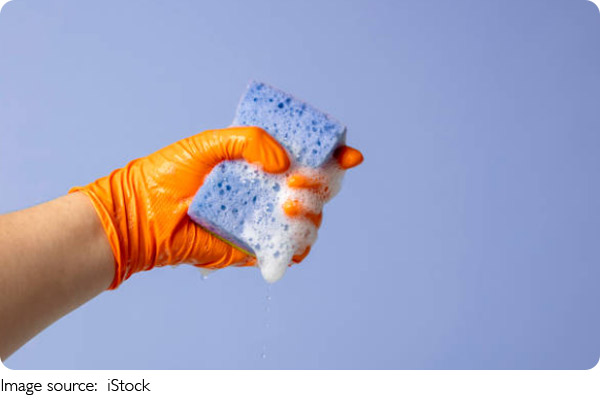Clean Kitchen Grease

The kitchen is the heart of the home, but it's also one of the areas most prone to dirt and grease buildup. Cooking oils, splatters, and spills are inevitable, but tackling stubborn grease doesn't have to be a time-consuming task.
If you've ever been frustrated by greasy stovetops, splattered range hoods, or oily counters, you're not alone. Grease stains seem to accumulate in no time and can feel impossible to remove without heavy scrubbing or harsh chemicals.
Fortunately, there are fast, effective ways to clean kitchen grease using common household items. In this article, we'll explore proven methods to get rid of stubborn grease without harming your surfaces or spending hours on cleanup.
1. Baking Soda and Vinegar: The Dynamic Duo
One of the most effective and natural ways to clean kitchen grease is by using a combination of baking soda and vinegar. Baking soda is mildly abrasive, making it perfect for scrubbing away grease without scratching surfaces, while vinegar acts as a degreaser that breaks down oils.
To create your cleaning paste, mix two parts baking soda with one part water to form a thick paste. Apply it directly to the greasy areas, such as stovetops or countertops, and let it sit for about 15 minutes. For tougher spots, sprinkle a bit of vinegar over the paste. This will cause a fizzing reaction, which helps to lift the grease and grime. Use a soft cloth or sponge to scrub, then wipe clean with a damp cloth.
2. Dish Soap and Hot Water: A Simple Solution
Dish soap is designed to break down oils, so it's no surprise that it works wonders on kitchen grease. Combine it with hot water, and you have an excellent degreaser that can handle even the most stubborn grease spots. This method is particularly effective for cleaning stovetops, countertops, and greasy cabinets.
Fill a bucket with warm water and add a few drops of dish soap. Dip a microfiber cloth or sponge into the solution, wring it out, and begin wiping the greasy surfaces. For tough spots, let the solution sit for a minute before scrubbing. Make sure to rinse and dry surfaces to avoid any soap residue.
3. Citrus-Based Cleaners: Fresh and Effective
Citrus cleaners are a popular choice for those looking for an eco-friendly, pleasant-smelling solution to grease buildup. The natural oils in citrus, especially lemon, are highly effective at cutting through grease and grime. You can either buy a commercial citrus-based cleaner or create your own.
To make your own cleaner, mix equal parts water and lemon juice in a spray bottle. You can also add a few drops of essential lemon oil to boost the scent. Spray the solution onto greasy surfaces, let it sit for a few minutes, and then wipe it off with a clean cloth. The acidity in lemon juice helps break down grease without damaging surfaces.
4. Commercial Degreasers: Quick and Powerful
For tougher grease that just won't budge, a commercial degreaser can be a lifesaver. These products are specifically designed to dissolve grease and grime quickly, saving you time and effort. However, when using a commercial degreaser, be sure to follow the instructions and test the product on a small area first to ensure it won't damage your surfaces.
Some popular options include spray-on degreasers, foam cleaners, or even wipes. Just spray or apply the degreaser to the greasy area, let it sit for the recommended time, and then wipe it away. Be sure to ventilate your kitchen properly when using chemical cleaners and avoid mixing them with other substances.
5. Steam Cleaners: A Chemical-Free Option
If you're looking for a completely chemical-free solution, a steam cleaner is a great option. Steam cleaners use high-temperature steam to break down grease, dirt, and grime without the need for any harsh chemicals. This method is especially useful for cleaning stoves, ovens, and range hoods.
To use a steam cleaner, simply attach the appropriate nozzle and direct the steam toward greasy areas. The heat from the steam will loosen the grease, making it easy to wipe away with a microfiber cloth. Steam cleaners are also great for cleaning behind appliances and other hard-to-reach areas.
6. Use a Degreasing Wipe for Quick Touch-ups
When you're in a hurry and just need a quick solution for greasy kitchen surfaces, degreasing wipes are a handy option. These wipes are pre-moistened with a degreasing solution and are designed for fast, on-the-go cleaning. Simply grab a wipe, and wipe down stovetops, countertops, or any greasy spots that need attention.
While not as effective for deep cleaning, degreasing wipes are perfect for light touch-ups and maintaining a clean kitchen throughout the day.
7. Clean Regularly to Prevent Buildup
The key to managing kitchen grease is cleaning regularly. Instead of waiting for grease to accumulate into tough stains, make it a habit to wipe down your stovetop and countertops after every cooking session. By doing this, you can prevent grease from becoming embedded in your kitchen surfaces, making future cleaning easier and faster.
A quick daily wipe-down with dish soap or a citrus-based cleaner can help keep your kitchen grease-free and ready for the next cooking adventure.
8. Deep Clean Appliances with Baking Soda Paste
Appliances like ovens and microwave ovens tend to accumulate grease and food splatters over time. For a deeper clean, try a paste made of baking soda and water. Apply the paste to the greasy areas inside your oven or microwave, and let it sit for 15-20 minutes. Afterward, scrub the surface with a non-abrasive sponge or cloth, and wipe away the residue with a damp cloth. This method works especially well for ovens and grills that have accumulated baked-on grease.

9. Prevent Future Grease Build-up with a Splatter Guard
To keep your kitchen grease-free in the future, consider investing in a splatter guard for your stove. These simple devices prevent oils and grease from splattering onto your stovetop while cooking. Using a splatter guard is an easy way to reduce the amount of grease that accumulates during cooking, making post-cooking cleanup much easier.
Conclusion
Cleaning kitchen grease doesn't need to be a difficult or time-consuming chore. With the right tools and a few helpful tricks, you can easily tackle grease buildup in your kitchen. Whether you prefer natural solutions like baking soda and vinegar, or you opt for quick and effective commercial cleaners, regular maintenance and quick touch-ups can help keep your kitchen spotless. With these tips, you'll be able to create a cleaner, more hygienic kitchen without spending hours on cleanup.
-
 Plant ResilienceEffective strategies for helping plants cope with climate change’s growing challenges.
Plant ResilienceEffective strategies for helping plants cope with climate change’s growing challenges. -
 Watermelon Salad MagicDiscover the perfect blend of sweet and spicy in this refreshing salad that will elevate your summer dining experience.
Watermelon Salad MagicDiscover the perfect blend of sweet and spicy in this refreshing salad that will elevate your summer dining experience. -
 Succulent LifeTransform Any Space into a Lively Succulent Haven with These 8 Creative Styles!
Succulent LifeTransform Any Space into a Lively Succulent Haven with These 8 Creative Styles!